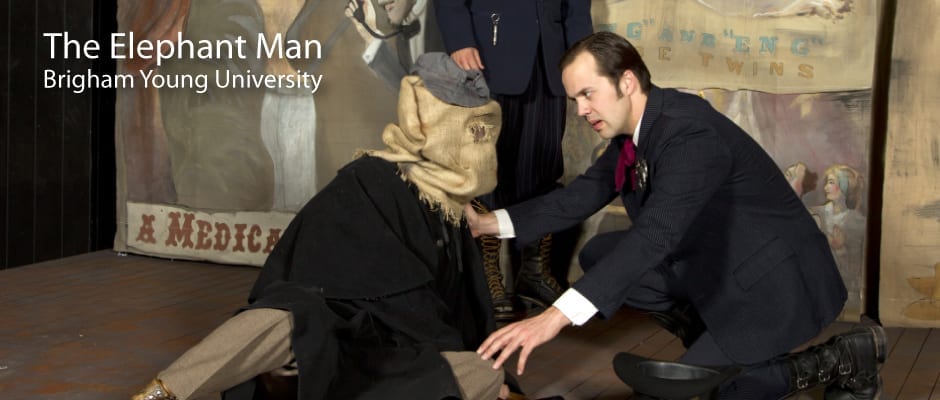
PROVO — “If your mercy is so cruel, what do you have for justice?” Set in London 1884, Brigham Young University’s production of The Elephant Man creatively recounts the story of John Merrick, better known to history as the Elephant Man.
Being horribly disfigured and forced into carnival freak shows, the play picks up with Merrick coming into the custody of a doctor who tries to shelter him from his difficult circumstances. The production humbly deals with issues of abuse, acceptance, conformity, and the everyday battle to find happiness in a world that is often cruel to those who don’t belong, or even those who just don’t feel like they do. This dark and abstract work lovingly addresses these topics, along with many others, creating one of the most interesting pieces of art that I have ever seen in the valley.
There is a reason that BYU recommends the show to audiences age 12 and older. There is no mistaking, that while beautiful, this show deals with mature themes that are as moving as they are dark, but, unlike many dark pieces, there is no frivolity or uselessness to the darkness. The mood of the show left me touched and enlightened as I contemplated the inherent questions of the show. The show may not be for everyone, but I argue that it is for anyone with a thick skin, open mind, and a willingness to learn from others’ follies. Please also note that, while I refer to dark themes, I do not think that there is inappropriate content for the conscientious adult.
The clever directing (David Morgan, assisted by Shanti Rose) created times of alienation in which the audience was nudged out of the story just long enough to think about the story’s implications and to ask meaningful questions of themselves. These moments were pieced seamlessly together with moments of simplicity and honesty. Be ready for a step away from traditional theatre as the actors use props, sound effects, and lighting as extensions of their characters and instruments to create the tragic world of the play.
It is sometimes difficult to pluck actors from a traditional theatre background into a nonrealistic piece. There is often an obvious learning curve as actors try to balance abnormality with the formation of real characters. The actors in The Elephant Man did not seem to face this problem. Led by the natural intuition of Graham Ward (John Merrick) and charismatic Darick Pead (Fredrick Treves), the cast was able to blend heart with theatrical convention.
Ward shined with an easiness that seemed impossible for a character as complex, physically and emotionally, as the elephant man. He was able to balance the heart of John Marrick with the physical difficulty of the elephant man. Pead caught hold of the abstract vision of the production in his acting and invited the audience to participate. Other outstanding performances were those of Gabrielle Cunningham (Mrs. Kendall), who was able to have confidence and humility in her character all at once, and Jennifer Chandler (Cellist/ Narrator) who phenomenally scored and performed the music throughout the show.
Another stand out element was that of the set (Carter Thompson). The set seemed to function as a canvas of the director’s concept and conventions while making a statement all on its own. The themes surrounding the freak show were driven home by a surprisingly understated and beautiful set. The lighting (Mark Ohran) was also notable as it assisted, not only in mood, but also in great function to the show. All of the other elements seemed to come together to assist the show as well.
I strongly encourage one and all to step in and see The Elephant Man. Come with an open mind and a willing heart to this fantastic piece of art that asks if, “to become more normal is to die?” Let it inspire audience and artists alike to demand more thought provoking and progressive theatre to be done here in the Utah Valley.
[box type=”shadow”]The Elephant Man plays November 8-12, 16-19 at 7:30 PM and November 12 at 2 PM in the Margetts Theatre of the Harris Fine Arts Center on the campus of Brigham Young University. Tickets are $7-14. For more information, visit BYUarts.com.[/box]

